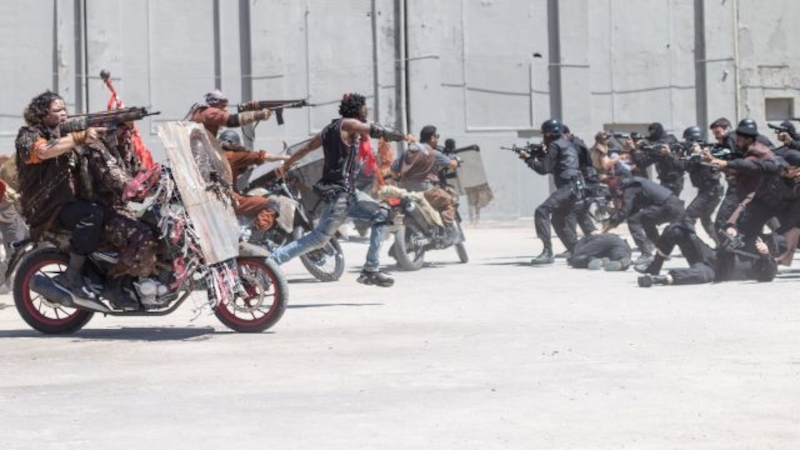Director – Guel Arraes – 2023 – Brazil – Cert. none – 114m
*****
The constantly shifting relationship between a man and his friend constantly shifts against the backdrop of a war between a street gang protecting their turf and an army trying to impose law and order – premieres in the Critics’ Picks Competition at the 27th Tallinn Black Nights Film Festival
Riobaldo (Caio Blat) tells his story. As a young boy in the urban jungle of Brazil’s Sertao, he bonds with fearless kid his own age Diadorim, who shows him how to scale brutalist towers and scare off predatory adults with an effective flick of the knife.
By the time Riobaldo has grown up to become a teacher, this concrete sprawl has become the battleground for a struggle between a gang led by local, criminal warlord Joca Ramiro (Rodrigo Lombardi) and forces under the command of Colonel Zé Bebelo (Luis Miranda) determined to restore law and order to the country. They may trade in violence, but both leaders are honourable men.
Not so one of Joca’s lieutenants Hermógenes (played with great relish by the ingratiating Eduardo Sterblitch), a seemingly unstoppable force of nature who has sold his soul to the devil to advance his own ends.
Riobaldo’s educational ideals and hope for the country’s future are shattered by the pointless death of a star pupil when she is caught and killed in the crossfire of a street fight between the opposing gang and military factions.
In contrast to Riobaldo’s path, the grown-up Diadorim (the director’s daughter Luisa Arraes) becomes a fighter in Joca’s gang: the sort of fighter that bests several assailants one after the other in a sequence that will have action fans drooling. Luisa, at least as costumed, coiffed and made up here, is an androgynous type that could pass for male or female, an attribute shared by the child actor who plays her younger self. When we first see the character in action, they read as female. After a while, though, you forget about it and start to read the character as male.
What follows is on a macro level the story of the two groups waging war on one another, with power structures constantly shifting and weaving within and between them, and on a micro level the story of Riobaldo and Diadorim which in its very nature is also given to shifting and weaving around.
On the former, one could imagine it being the sort of thing Shakespeare would write with its attention to the character detail which informs power struggles (and I’ve long suspected that, if he had been born in modern times, he would have been not only writing but also directing movies).
By that same token, it would sit well beside feudal samurai mode Akira Kurosawa (think Throne of Blood or Ran – both Shakespeare plots) or, for that matter, Baz Luhrman’s Romeo + Juliet, which recast the warring of two houses with ballistic, John Woo style gunplay. Visually, it riffs off futuristic and / or biker gang movies, although there’s not much in the way of SF or biker trappings. Don’t be fooled into thinking this is some turgid, literary outing that would have been better left as a book: among other things, it’s a bravura piece of action cinema. And yet, it’s also much, much more.
In fact, it’s an adaptation of the 1956 Brazilian Portuguese literary masterpiece The Devil to Pay in the Backlands / Grande Sertão: Veredas by João Guimarães Rosa which was previously filmed in 1965 using the milieu of cowboys which is much closer to the rural setting of the original novel.
On the latter, the story of Riobaldo and Diadorim, it’s part buddy movie, part bromance and part unrequited love story, often with strong homoerotic overtones. You could argue that the whole thing is a lot like Shakespeare’s Romeo and Juliet, except for the (fairly major) fact that the two lovers are on the same side of the conflict. Again, the handling of the characterisation at this more personal level is worthy of a Shakespeare or a Kurosawa.
In short, a truly extraordinary film.
Great Sertão premieres in the Critics’ Picks Competition at the 27th Tallinn Black Nights Film Festival which runs in cinemas from Friday, November 3rd to Sunday, November 19th.
Trailer:
This article originally appeared on DMovies.org: you can find it here.
